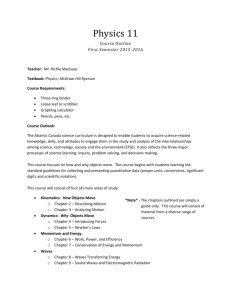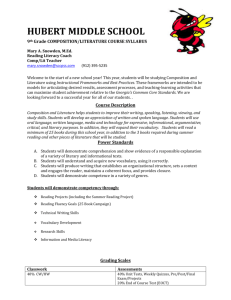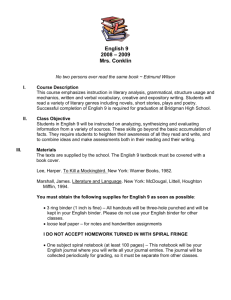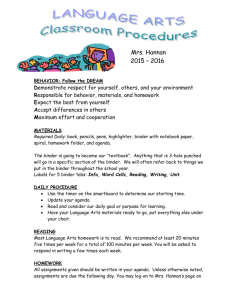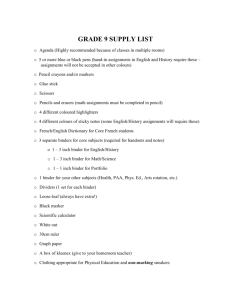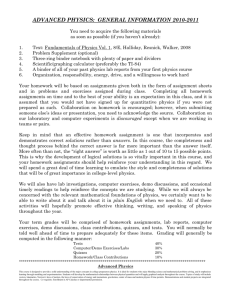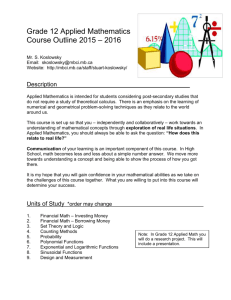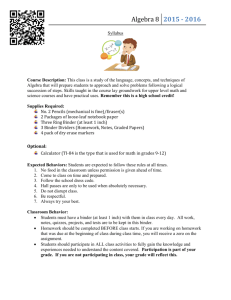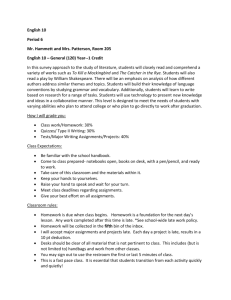Sixth Grade Science
advertisement
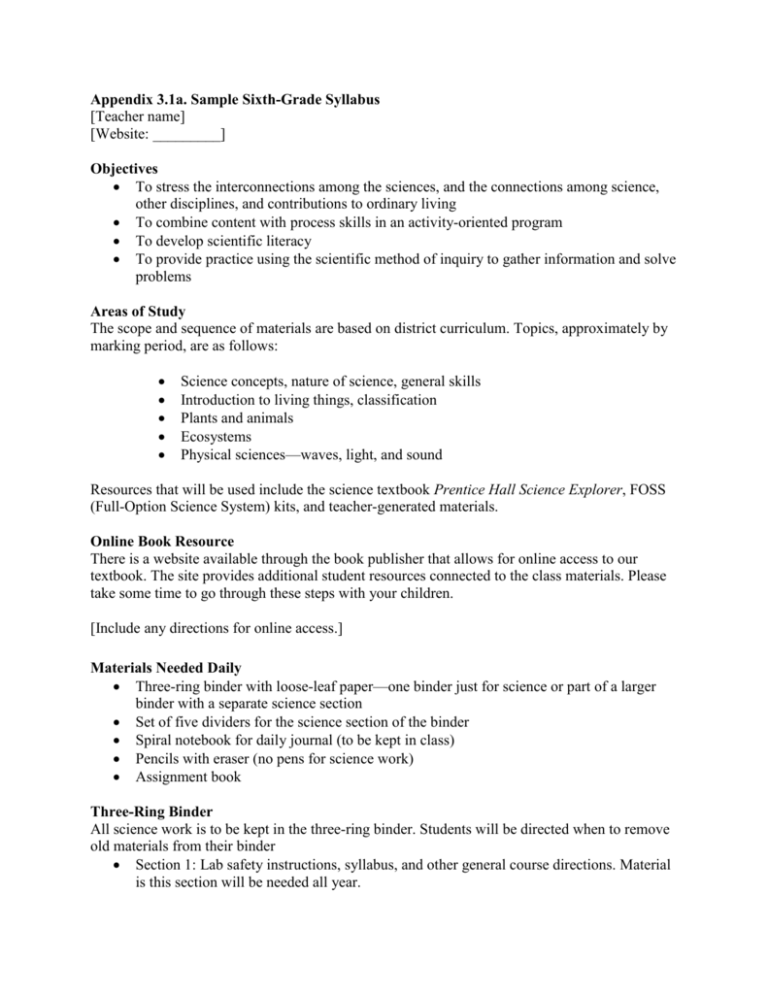
Appendix 3.1a. Sample Sixth-Grade Syllabus [Teacher name] [Website: _________] Objectives To stress the interconnections among the sciences, and the connections among science, other disciplines, and contributions to ordinary living To combine content with process skills in an activity-oriented program To develop scientific literacy To provide practice using the scientific method of inquiry to gather information and solve problems Areas of Study The scope and sequence of materials are based on district curriculum. Topics, approximately by marking period, are as follows: Science concepts, nature of science, general skills Introduction to living things, classification Plants and animals Ecosystems Physical sciences—waves, light, and sound Resources that will be used include the science textbook Prentice Hall Science Explorer, FOSS (Full-Option Science System) kits, and teacher-generated materials. Online Book Resource There is a website available through the book publisher that allows for online access to our textbook. The site provides additional student resources connected to the class materials. Please take some time to go through these steps with your children. [Include any directions for online access.] Materials Needed Daily Three-ring binder with loose-leaf paper—one binder just for science or part of a larger binder with a separate science section Set of five dividers for the science section of the binder Spiral notebook for daily journal (to be kept in class) Pencils with eraser (no pens for science work) Assignment book Three-Ring Binder All science work is to be kept in the three-ring binder. Students will be directed when to remove old materials from their binder Section 1: Lab safety instructions, syllabus, and other general course directions. Material is this section will be needed all year. Section 2: Homework, worksheets, and vocabulary Section 3: Classwork, including notes, outlines, and lab reports Section 4: Tests, quizzes, and other grades Website: ____________ My website contains all daily journal entries, homework assignments, and other class information. It also contains a number of links to science-related sites. Please visit and provide feedback on the content and links. Class Expectations and Rules Exercise respect, responsibility, and self-control. Be prepared every day and arrive on time. Have an open mind and a willingness to learn. Maintain a positive attitude and do your best. Follow all teacher and school rules—no gum chewing or food in class. Remember: Safety is always first! Makeup Policy For brief absences, please see another student on the team. Pick a friend to be your homework buddy and study partner for science. Students with a music lesson or other activities during science must first check in, turn in homework, and find out what they will miss during class. The student must come to the next class prepared. For other absences and illnesses, students are responsible for work assigned before their absence on the day they return. For assignments given during the illness or absence, please see the teacher to establish a due date for missing work. If a student misses a test due to an absence, he or she should be ready for the test on the day he or she returns. Grading Policy Completion of daily homework assignments: Homework will have a value of three possible points unless otherwise noted. A student will earn the full three points for homework that is complete and neat. Homework will be reviewed in class, and accuracy will be the student’s responsibility. Points will be deducted for homework that is not in the proper format (name, title, date), incomplete, or messy. Work that is unfinished or turned in late (except for absences) will receive a zero. Daily homework will be less than 20% of the marking period grade. Time spent on homework should be 10–15 minutes per night. Please contact me if you find homework is taking more time. Quizzes and tests: Quizzes will have a value of 20–50 points. Tests will usually have a value of 100 points. Tests will be given on days 1 and 4. Quizzes may be given any time, without notice Lab reports and class assignments will generally have a value of 20–50 points. Projects or reports will have a value of 100–200 points each. We will spend time in class on these assignments, but some work will be required at home. “Ready to Learn” points that reflect class participation, behavior, and preparation are worth 50 points each marking period. Daily journal reviews (approximately two per marking period) will be worth 50 points each. Two or three newspaper or current events article reviews and summaries per marking period will each be worth 25 points. Late assignments will be penalized 1/2 grade for every day late. Assignments not turned in (except for daily homework) will receive a maximum grade of 40% of the assignment value. Makeup/Extra Help Please schedule an appointment with me in room ___ for extra help. Every student should be able to succeed in my class, so please ask for help if you need it. I look forward to this year and have great expectations for the students in my class. Working together, we can achieve success and have fun at the same time. Please contact me through email at ______ if you have any questions or concerns. Note: Thank you to members of the NSTA Listserv for sharing their work. Student and Parent Acknowledgement Sixth-Grade Science I have read and understand the course outline and expectations for Mr. ______’s 6th-grade science class. Please include an e-mail address (neatly printed) for the student’s parents. ______________________________________ Student name (printed) _____________________________ Student signature _______________________________________ Parent name (printed) ______________________________ Parent signature Period: ________________ __________________________________________ Parent e-mail address (Printed) Anything you want me to be aware of about your child? (Thank you to members of the NSTA Listserv for sharing their work.)
